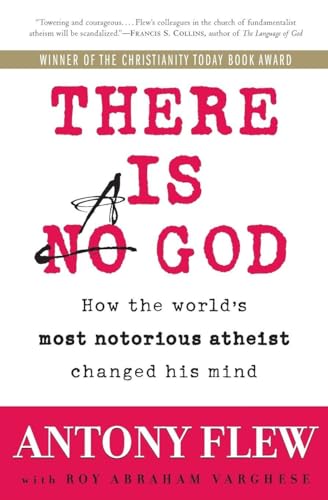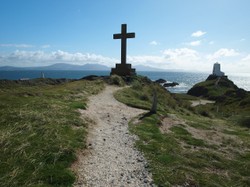Like Bloom Lewis came from a Christian family, Northern Irish Protestants, but he lapsed. However, unlike Bloom who had a powerful moment of revelation, Lewis' path to God came through a combination of influences before a revelatory moment.
Lewis, who returned to Christianity while a philosophy lecturer at Oxford, was never a materialist. He was an idealist, a believer in an ultimate reality, an absolute, accessible by reason and known non-personally.
But his path to faith came from the transformation of his idealism and his shedding of prejudices, under friends' influence. Barfield helped him shed his anti-mediaeval prejudices, showing him that mediaeval should not be a term of disparagement, because ideas can go from fashion for bad reasons. Another friend,Cogshill, challenged his anti-Christian prejudices that Christians were stupid and uneducated, for Cogshill was one of the most intelligent and well informed people Lewis had ever known. A third friend, Tolkien, made him face up to his anti-Catholic prejudices learned from his Northern Irish background, which taught him never to trust a papist.
But there were writers whom he admired. G.K.Chesterton, Lewis considered the cleverest man alive, except for his Catholic faith.He was later to come to see that Chesterton's wisdom was integrally connected to his Catholicism. Reading Chesterton's Everlasting Man, a life of Christ, shook Lewis to the core. Moreover the Anglican poet George Herbert, who viewed life from the perspective of the Christian mythos, inspired but annoyed Lewis. Could he not do without the Christianity! But Lewis began to feel that religious writers were somehow more interesting and deeper than non-religious ones, but he hung on to his non-belief, fighting a struggle with the presence that was growing closer to him and more intense.
Another moment unsettled him. Having read Frazer's Golden Bough, which spoke of the Myth of the Dying and the Rising God, he heard a dyed in the wool atheist academic say that it was a rum thing, but that it seemed to have happened once. Again, Lewis' world-view became unsettled, but he persisted in his rejection of Christianity. Non-belief was becoming hard work.
The final moment came when alone in his study at Oxford he yielded to the presence that had been calling him. He had for a while become convinced that he was wearing an emotional suit of armour against the call of the divine presence, than in that lonely moment he surrendered, transformed his idealism and admitted that God was God. There were still moves to be made. He had at that moment converted to theism, general belief in God, but he was later to decide for Christianity. His book Surprised by Joy,speaks of the joy that comes with belief. This is not a state of excitement but of fulfillment greater than the travails of the moment. Strangely, having scorned Herbert's use of the Christian myth in literature, Lewis' transformation led to his using it as the literary theme of the Narnia series, quite a turn around.
[See Surprised by Joy, chapter 14]









 TheThousand Year Gardenon 11/26/2025
TheThousand Year Gardenon 11/26/2025
 Women of the Gospelson 10/11/2025
Women of the Gospelson 10/11/2025
 Religious Gardenson 08/25/2025
Religious Gardenson 08/25/2025
 Doctor of the Church: John Henry Newmanon 08/03/2025
Doctor of the Church: John Henry Newmanon 08/03/2025



Comments
At times I have resorted to separating letters to prevent this checker from operating., e.g. t e a c h.
Thank you!
That spelling-checker is quite furtive in its stubborn insistence, despite all orthographical facts and rules to the contrary.
You of course know as Gaelic the next-last word in my comment below, correct?
It muscled in Gaeic time and time again even as I managed to modify it back to Gaelic until it somehow prevailed as Gaeic between my last modification and my last submitted save.
I think that it was accepted
Thank you!
Queen's University Belfast and Trinity College geneticists communicated DNA results regarding a 5,000-year-old skull in Proceedings of the National Academy of Sciences online Dec. 28, 2015.
The aforementioned scientists described as dating from 3343 BC to 3020 BC the Ballynahatty Neolithic skull discovered in northern Ireland in 1855. They equated that skull with Near East and Pontic Steppe origins!
How might those results have been received by academic and non-academic appreciators of Gaeic culture?
Much speculation, little knowledge.
Thank you!
English Wiktionary attributes the earliest known references to Druids as from the 4th century B.C.
Did everyone just accept the Druids as native to what is now modern-day Britain, France and Ireland?
Or was there speculation as to other original homelands?
There !was general agreement between them,but little information was given.
Thank you!
Encyclopedia Britannica online associates ancient writings about the Druids with Julius Caesar. English Wiktionary attributes ancient-writer information about the Druids to Caesar, Cicero, Pliny the Elder and Tacitus.
Did the above-mentioned writers agree on Druids having or not having reincarnation beliefs?
Ancient writers said thatvdruids believed in reincarnation and in this view they were said to concur with Pythagoras
Thank you!
Buddhist reincarnation allows for recasting as animal or human sentients. For example, Gautama Buddha appeared in previous lives in animal- and human-sentient forms.
Non-Tibetan Buddhism approves animal-sentient reincarnations even as Tibetan Buddhism belittles reincarnations configured as sharp-clawed, sharp-toothed animals.
So there's no such extant druid traditions regarding certain animal or human reincarnations as desirable or non-desirable, correct?
(But perhaps the film Róise & Frank might be saying, if based on some Emerald-Isle tradition, that canine reincarnations would be fine ;-D!)